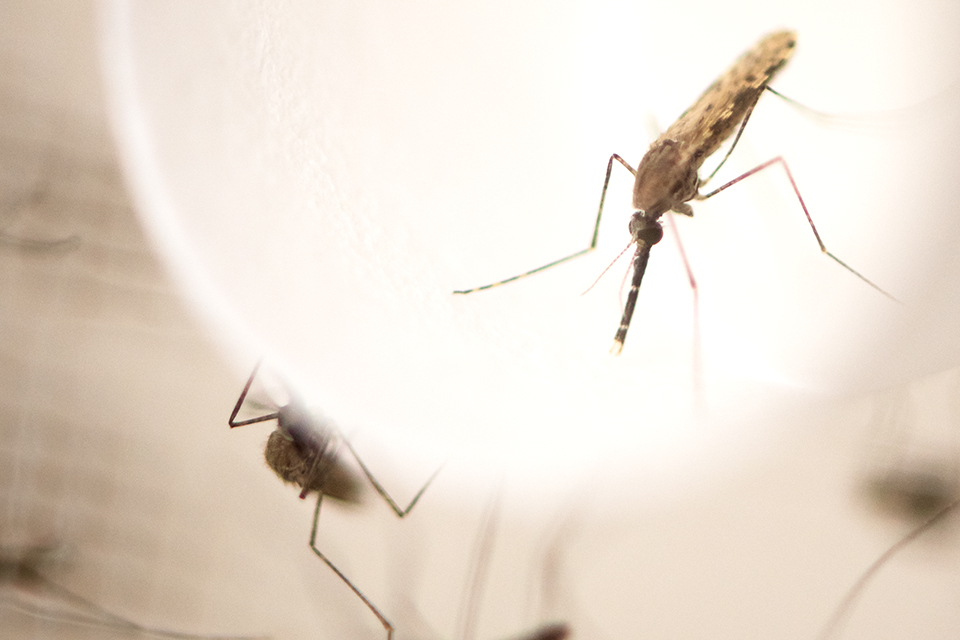K-State research provides new insight into mosquito immune systems

Biology professor Kristin Michel and doctoral recipient Bianca Morejon's research into the mechanisms of the African malaria mosquito's immune system was published in the Proceedings of the National Academy of Sciences. | Download this photo.
Bianca Morejon and Kristin Michel already know what you think when they mention they are mosquito researchers.
But even though these tiny insects are considered serious pests, the pair of Kansas State University biologists insist there's much to be learned about immunology, disease transmission, and biology in general from mosquitoes.
"If you are stressed out by mosquitoes, you’ll be amazed by all the stresses mosquitoes face," said Michel. "Not only do they have to escape bug zappers while taking a blood meal, but they also have to fend off everyday infections, just as we do."
Over the past few years, Morejon — a now-graduated doctoral candidate and former recipient of K-State's Sarachek Predoctoral Honors Fellowship — worked with Michel, professor of biology, to make groundbreaking discoveries into the immune system of Anopheles gambiae, the African malaria mosquito.
The pair's findings were published online earlier this week in the Proceedings of the National Academy of Sciences, one of the world's preeminent scientific journals.
The research was supported with grants from the National Institutes of Health and the USDA's National Institute of Food and Agriculture, as well as seed funding from K-State's Game-changing Research Initiation Program.
Devising a screen to investigate the mosquito immune system

Bianca Morejon.
Mosquitoes, like all other organisms, have an immune system that helps them fight infections.
Their immune system includes serine protease cascades that behave like dominos in triggering other enzymes to react to a potential infection. These chains of reactions are key in two major immune responses in mosquitoes: the generation of antimicrobial peptides, which kill bacteria directly, and melanization, which targets and cocoons invading pathogens with melanin, rendering them unharmful.
While scientists have known that mosquitoes have an unusually large number of these proteases, what was missing was a full picture of how, or if, these proteases interacted during a response to a potential infection, Michel said.
Over the last three years and as part of her doctoral work, Morejon separately tested 85 of these proteases to see how each affected the mosquito immune system.

Kristin Michel.
To do that, Morejon anesthetized female mosquitoes so she could use a microscope and a thin glass needle to inject them with double-stranded RNA that could knock down genes selectively. All told, Morejon estimates she injected approximately 100,000 mosquitoes.
After injections, Morejon could then measure how the immune system changed with two different tests.
"There's an assay that allows you to see melanin in mosquito waste," she said. "If you get increased melanization, you see darker waste. If you do this in enough mosquitoes and target different proteases, you can measure the impact of each protease on melanization without having to kill these mosquitoes."
"Because I did not have to kill the mosquitoes to measure melanization, I was then able to extract their hemolymph or ‘blood’ and measure if it can inhibit bacterial growth," Morejon added.
Paving the way for better understanding of immune systems
But only one of the 27 proteases affected both types, showing that these two immune response systems mostly work independently.
"The large number of proteases involved in immune system regulation was rather surprising to us, so we wondered if there would be a way to predict which ones are important," Michel said. "At a minimum, these proteases would have to be at the same time in the same space. Our data actually now show that those proteases that regulate the mosquito immune system are produced together before an infection ever happens."
These new insights give researchers a better baseline to make predictions about what is required for immune system regulation, Michel said. "Dr. Morejon's work shows that we can narrow down to something more manageable and figure out what interactions actually do need to occur to regulate an immune response," Michel continued.
The work could also inform future disease control efforts, either by boosting or defeating mosquitoes' immune system.
"Mosquitoes get infected with the same pathogens that they ultimately inject into us," said Morejon, now a post-doctoral researcher at Harvard's T.H. Chan School of Public Health. "If we understand how to boost their immune systems so they can kill a pathogen before it ever gets to us, or if we can make mosquitoes more susceptible to their own pathogens to kill them, we could use that knowledge to create better mosquito control measures and insecticides."
###
